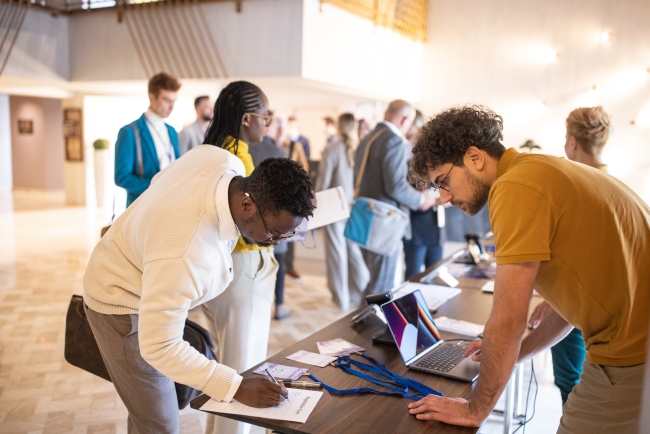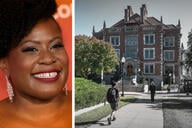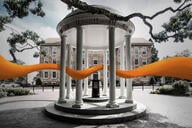You have /5 articles left.
Sign up for a free account or log in.

Two weeks ago, a white co-founder of what calls itself the world’s largest women’s history event garnered social media condemnation for saying, according to attendees’ tweets, that she wished she were Black so her career would’ve been easier.
Lois Banner’s reported statements—she hasn’t returned requests for comment on what she said—happened during the Berkshire Conference on the History of Women, Genders and Sexualities’ 50th anniversary plenary session.
That session, “We Have Changed History: A Celebration,” ended up a less-than-celebratory reminder that some things haven’t changed. Recent years have seen other allegedly discriminatory, or clearly discriminatory, incidents at other academic and professional conferences.
There was another Twitter eruption in 2019 regarding the joint Society for Classical Studies/Archaeological Institute of America conference. During a Q&A there, an independent scholar told a Black assistant professor of classics at Princeton University, who had just described an incident of racial profiling at the conference, “You may have got your job because you’re Black, but I would prefer to think you got your job because of merit.”
Also in 2019, a Black female New York University librarian alleged that a fellow American Library Association council member, who was white, “verbally attacked” her at that association’s conference. She further alleged that the group’s legal counsel tried to intimidate her into silence, while the association denied this and said the other council member had resigned.
A president of a state library association said back then that inappropriate conduct has “always been going on” at academic meetings, “but now people are reporting it on social media.”
Conferences have been facing pressure to relocate out of red states. But the alleged American Library Association incident happened in Seattle, the Society for Classical Studies/Archaeological Institute of America situation occurred in San Diego and this year’s Berkshire one took place just outside of San José, Calif.
If past is precedent, conferences will continue to grapple with how to handle, and hopefully prevent, discriminatory incidents—while still trying to allow for freedom of expression.
Helen Cullyer, the Society for Classical Studies executive director since 2016, said her organization introduced a new policy in the wake of the 2019 incident and hired a professional ombudsperson. She said many conferences now have this position.
People can go to the ombudsperson when they experience discrimination, harassment or other issues, she said, and the ombudsperson may attempt conflict resolution or, in more serious or even dangerous situations, report to management.
“Every situation is different, and the policy is really meant to be a guide,” she said, though it doesn’t provide a road map for each specific instance.
As for prevention, she said attendees must “assert on the registration form that they have read and they will abide by our Professional Conduct and Harassment Policy.” Other conferences have taken similar steps.
The 2023 version of the policy says the Society for Classical Studies and Archaeological Institute of America “do not seek to limit the areas of inquiry of their members or to curtail robust scholarly debate, rather, the aim is to promote critical and open inquiry free of personal harassment, prejudice and aggression.”
It includes regulations for remote attendees, such as the admonition to follow individual session organizers’ rules.
“Session hosts reserve the right to remove from a session any attendee who disrupts a session by not observing the stated rules,” the policy says.
It defines harassment to include, among other things, “solicitation, bullying, hostility or abuse based on age, disability, ethnicity, gender expression, gender identity, institutional affiliation, marital status, national origin, race, religion, sex, sexual orientation, socio-economic status” and other categories.
The policy references both a joint Society for Classical Studies–Archaeological Institute of America “rapid response” team and a Joint AIA-SCS Harassment and Discrimination Committee. That committee looks into formal complaints that require postconference investigation, invites written responses from the accused and recommends possible sanctions to the AIA and SCS governing boards.
In an email, an American Library Association spokesman pointed to a Statement of Appropriate Conduct that says, “ALA is strongly committed to diversity, equity and the free expression of ideas.” The spokesman said every conference attendee “is required to acknowledge and confirm that they have reviewed and understand the code of conduct.”
The American Historical Association’s executive director, Jim Grossman, said, “Conferences are opportunities for people to share ideas in a collegial and constructive way. And our job is to establish environments in which that is most effective.”
Ahead of this year’s annual conference, Grossman wrote to session chairs that they should “call on a diverse group of questioners.”
He also wrote,
Be prepared to engage offensive or discriminatory comments in a way that lowers the temperature and maintains a constructive tone to the conversations. This is difficult terrain; just do your best in your role of defusing controversy that is veering into what might be considered offensive. It is better for you, rather than panelists, to nudge aside inappropriate audience contributions. Do not be afraid to cut off a member of the audience if they are going on and on and on. Or if they are veering into offensive terrain, to jump in and say ‘Let’s try to keep this on a constructive note. I think it’s best to move onto the next question.’ Or to cut someone off with ‘please get to your question.’ It is similarly important to make sure each of the panelists has an opportunity to speak to any issue that has been raised. And, to maintain an environment in which panelists consider it legitimate to disagree with one another, and engage that disagreement.
Additionally, Grossman provided chairs an email address to use “as soon as possible” to report violations of the association’s code of conduct. That code defines harassment, and adds, “Harassment might also include unprofessional and unethical behaviors, such as intentionally misgendering someone, refusing to use a person’s preferred pronouns or making inappropriate remarks about a person’s gender identity or sexual orientation.”
In late May/early June in New Orleans, at the National Conference on Race and Ethnicity in Higher Education (NCORE), all-gender restroom signs that the conference had posted in the host hotel were “tampered with and ripped down,” according to an email NCORE sent attendees.
But Joanna Schwartz, a Georgia College and State University marketing professor who is transgender, found the response compelling. Not only was there the quick email, but Justin Lincks, NCORE’s senior program administrator, read the statement out before a keynote speech.
“This was the head of the conference who really got up and passionately made a statement that everybody there got behind in a way that was uniquely powerful,” Schwartz said.
“The outsized response of inclusivity was a really powerful statement at a time when, you know, people at this conference are coming from states where their trans and nonbinary populations are under attack,” she said.
The statement included this: “As we enter Pride Month, we want to remind our community of the words of Audre Lorde from her speech, ‘Learning from the 60’s’, ‘there is no such thing as a single-issue struggle because we do not live single-issue lives.’”
Anthony Natale, NCORE’s director, said he doesn’t believe conference attendees took down the signs, which were over the men’s and women’s bathroom signs.
He said he recalls the email to attendees about the situation went out that night and the statement was read out sometime after. Natale, who is gay, said he couldn’t read it himself.
“It was too close—it hits too close to me,” he said.
“I think the response was really well received,” he said. “It is a space, it is a refuge, a place for people who have historically not found a space in institutions.”
Before and unrelated to the incident, he said NCORE “took the best of the best” procedures from other conferences.
“Conference culture has a whole culture to it, and we recognized that some of our sister conferences had some real struggles,” he said.
The Berkshire Conference, which didn’t respond to requests for comment, expressed regret for not moving faster on the Lois Banner incident.
“Dr. Deborah Gray White [a Rutgers University history professor] gave a compelling speech on the absence of Black women in the Berkshire Conference’s early years and how the organization has been exclusionary,” said a July 5 statement from the Berkshire Conference executive board. The board went on to condemn Banner’s comments.
“Banner was called out by an audience member on her racist statements and refused to apologize or back down,” the statement said. “Many attendees walked out. The panel eventually continued, with presenters delivering comments as scheduled. No one grappled with the difficult history of the organization shared by Dr. White. This was our grave mistake, as was not reacting quickly to Banner’s comments as they happened. Before the second roundtable began, Co-President Dr. Barbara Molony apologized and spoke out against Banner’s comments, and later in the program, Vice President Dr. Deirdre Cooper Owens directly addressed Banner’s words using Black feminist praxis.”
“Banner’s comments and other micro-aggressions at the conference were particularly harmful as the Supreme Court of the United States announced its ruling to dismantle affirmative action in higher education that very day,” the statement said.
The board ended by promising change. It also called upon “white women who are tenured or tenure-track to be leaders in this work so that the burden of changing racist practices does not fall on scholars of color.”




